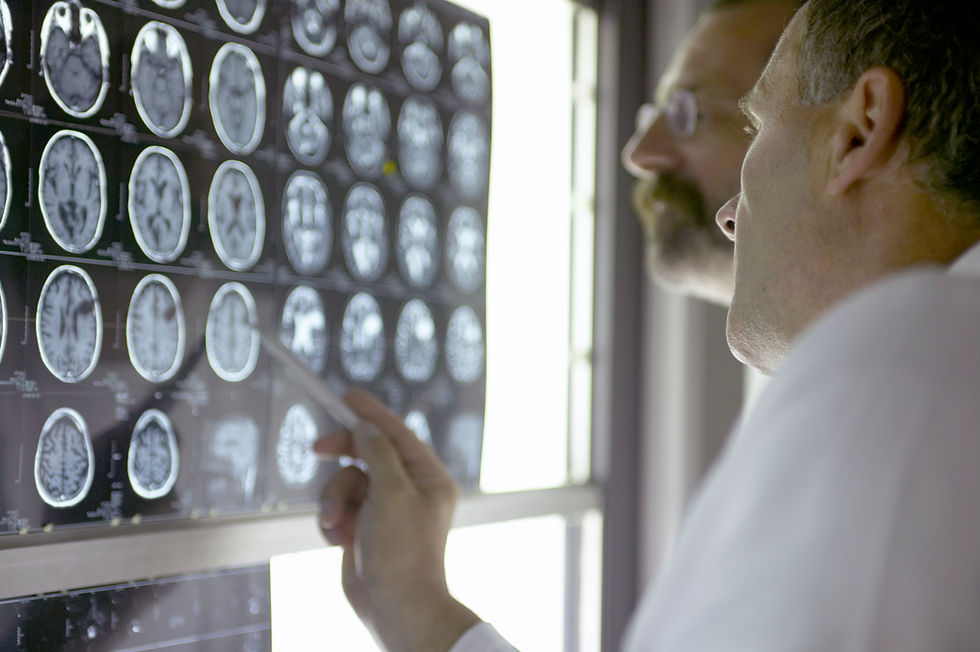March is Brain Injury Awareness Month: Protecting Your Mind in Every Profession
- Kylie Phillips
- Mar 1, 2025
- 4 min read
March is Brain Injury Awareness Month, a time dedicated to shedding light on the prevalence, impact, and management of brain injuries. Whether you work in high-risk environments like the horse industry or in a seemingly low-risk office job, concussions and traumatic brain injuries (TBI) are more common than many realize. Even minor brain injuries can lead to prolonged symptoms that alter daily life. Fortunately, therapies like Pulsed Electromagnetic Field (PEMF) therapy and other holistic options can aid in recovery and symptom management.

A Personal Experience with Concussions
I don’t usually share my personal experiences in these monthly blogs, but this one hits home.
Last year, I suffered the worst concussion of my career after a fall from a new horse. It was one of those moments where you instantly know you’ve rocked your own world. I was bedridden for days due to nausea and light sensitivity, but like most horse people, I got back to work as soon as possible. That’s when I started to realize just how often I actually hit my head in my day-to-day routine—something I had never paid much attention to before.
Since then, I’ve become painfully aware of the long-term effects of multiple small injuries accumulated over a lifetime of an active lifestyle. Even minor, repeated concussions add up, and the consequences can affect everything—from memory and mood to balance and overall brain function. Please, if you think you’ve had a brain injury, don’t brush it off. It affects every aspect of your life if left uncared for.
Brain Injuries in the Horse Industry and Beyond
The horse industry is a high-risk field for concussions and TBIs. Falls, kicks, and accidents while handling horses can result in serious head injuries. Studies show that horseback riding has one of the highest concussion rates among sports, with a greater risk than football, cycling, or skiing.
According to a National Library of Medicine study, approximately 45% of equestrian riders have experienced a concussion, yet many have not received formal education on head injury prevention (source).
But brain injuries aren’t exclusive to high-impact professions. The CDC estimates that 1.7 million people sustain a TBI each year in the U.S., many from everyday accidents like slips, falls, or car crashes. You don’t need to be a professional athlete or equestrian to experience a life-changing brain injury.
The Long-Term Impact of Even Mild Brain Injuries
Many assume that a mild concussion is just a temporary setback, but brain injuries—no matter how minor—can have lingering effects:
🧠 Brain fog and memory issues
😵 Headaches and dizziness
😡 Mood swings, anxiety, or depression
💤 Chronic fatigue and sleep disturbances
🔆 Sensitivity to light and sound
A condition called Post-Concussion Syndrome (PCS) affects 10-20% of people who experience a concussion, causing symptoms that persist for months or even years (Brain Injury Association of America). Those in active professions, like equestrians, may also struggle with balance and coordination issues, putting them at further risk of reinjury.

How PEMF Therapy Can Help Brain Injury Recovery
Pulsed Electromagnetic Field (PEMF) therapy is gaining recognition as a supportive treatment for brain injuries. PEMF stimulates cellular repair, improves circulation, and reduces inflammation—key factors in healing brain injuries. Research suggests that PEMF therapy can:
✔️ Reduce neuroinflammation, which contributes to prolonged concussion symptoms.
✔️ Enhance oxygenation in the brain, improving cognitive function.
✔️ Improve sleep and reduce stress, both critical for brain recovery.
✔️ Support nerve regeneration, aiding in restoring normal brain function.
A study published in the Journal of Neuroscience Research found that PEMF therapy significantly improved cognitive function in brain-injured patients by promoting neuroplasticity, the brain’s ability to adapt and heal itself.
Other Supportive Therapies for Brain Injury Recovery
While PEMF therapy offers promising benefits, brain injury recovery often requires a multi-faceted approach:
🔹 Physical & Vestibular Therapy – Restores balance, coordination, and mobility, especially for those with dizziness or instability.
🔹 Nutrition & Hydration – Omega-3s, antioxidants, and hydration support brain healing.
🔹 Red Light Therapy – May reduce inflammation and oxidative stress in the brain.
🔹 Cognitive Therapy – Brain exercises help retrain memory, focus, and processing speed.
🔹 Acupuncture & Chiropractic Care – Can relieve headaches, improve blood flow, and promote nervous system balance.
Protecting Yourself and Your Brain
No matter what profession you're in, brain health matters. If you ride horses, wear a properly fitted helmet every time. If you work in an office, be mindful of falls, car accidents, or unnoticed head injuries. If you experience a head injury, take it seriously—even if you feel fine at first. Symptoms sometimes take days or weeks to fully appear.
If you or someone you know is struggling with the long-term effects of a concussion, exploring alternative therapies like PEMF and other holistic approaches can make a significant difference.
Resources for More Information
Your brain is your most valuable asset—protect it, heal it, and give it the care it deserves. 💙



Comments